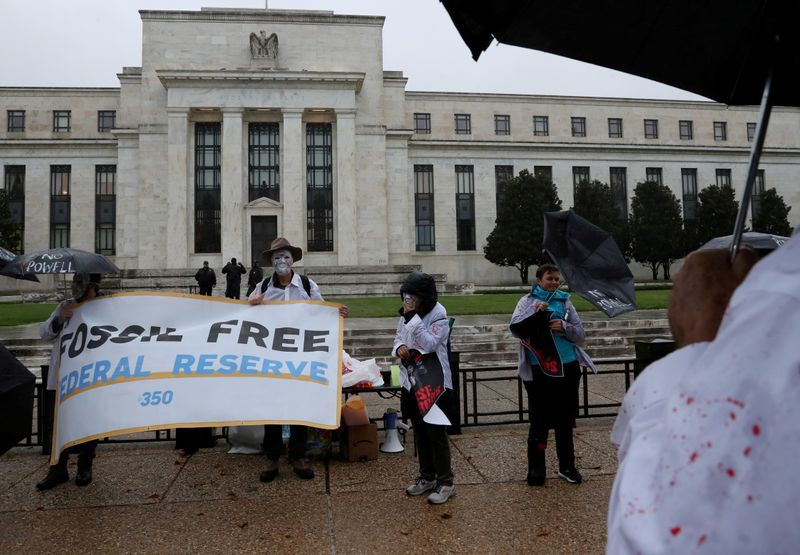Wall Street sees first Fed climate change review in 2023 By Reuters

© Reuters. FILE PHOTO: Climate change activists voice their opposition to U.S. President Joe Biden reappointing Jerome Powell to serve a second four-year term as the chairman of the Federal Reserve and demand Biden appoint a climate advocate, during a rally outside
By Pete Schroeder
WASHINGTON (Reuters) – While the U.S. Federal Reserve trails other major central banks in tackling climate change, it’s catching up on a critical front: figuring out if rising temperatures could topple a major bank or even the entire financial system.
The potential effects of climate change – namely through rising sea levels, worsening floods and fires, and government policies transitioning away from carbon-heavy industry – could destroy trillions of dollars of assets around the globe. As major lenders to the oil and gas industry, U.S. banks could be in the eye of the storm, according to regulators and risk management experts.
A U.S. Treasury Department-led report warned last month that rising temperatures were an “emerging threat” to financial stability and said regulators should use scenario analyses to build robust predictive risk-management tools.
Despite being the most influential central bank in the world, the Fed has long lagged its peers in getting a grip on those risks.
Over the past year, however, the Fed has ramped up pressure on big banks to scan their portfolios for climate change risks and could be in a position to run a formal scenario analysis and release broad findings to the public in 2023, according to seven industry executives with direct knowledge of the discussions who declined to be named.
The previously unreported growing industry consensus shows how regulators are trying to move quickly to execute President Joe Biden’s agenda to incorporate climate risk into the financial regulatory system, with major ramifications for Wall Street banks like JPMorgan Chase & Co (NYSE:) Citigroup (NYSE:), Wells Fargo (NYSE:) & Co, Bank of America Corp (NYSE:), Goldman Sachs Group (NYSE:) and Morgan Stanley (NYSE:).
A formal climate change scenario analysis would give regulators and investors the clearest picture yet of big banks’ exposure to climate change, and increase pressure on the industry to make good on pledges cemented at this month’s U.N. climate summit to transition away from fossil-fuel lending.
“Right now there really isn’t any data about the scale and magnitude, or really, system-wide risks,” said Todd Phillips, a director at think tank the Center for American Progress.
The banks declined or did not respond to requests for comment.
Some European regulators have already started testing their banks for climate change risks.
Reuters reported in May that Fed supervisors had begun privately pressing lenders for data and details on their efforts to assess the exposure of their loan books to climate change.
Those discussions are being driven by Kevin Stiroh, who began leading the Fed’s climate change supervisory work in February….
Read More: Wall Street sees first Fed climate change review in 2023 By Reuters
